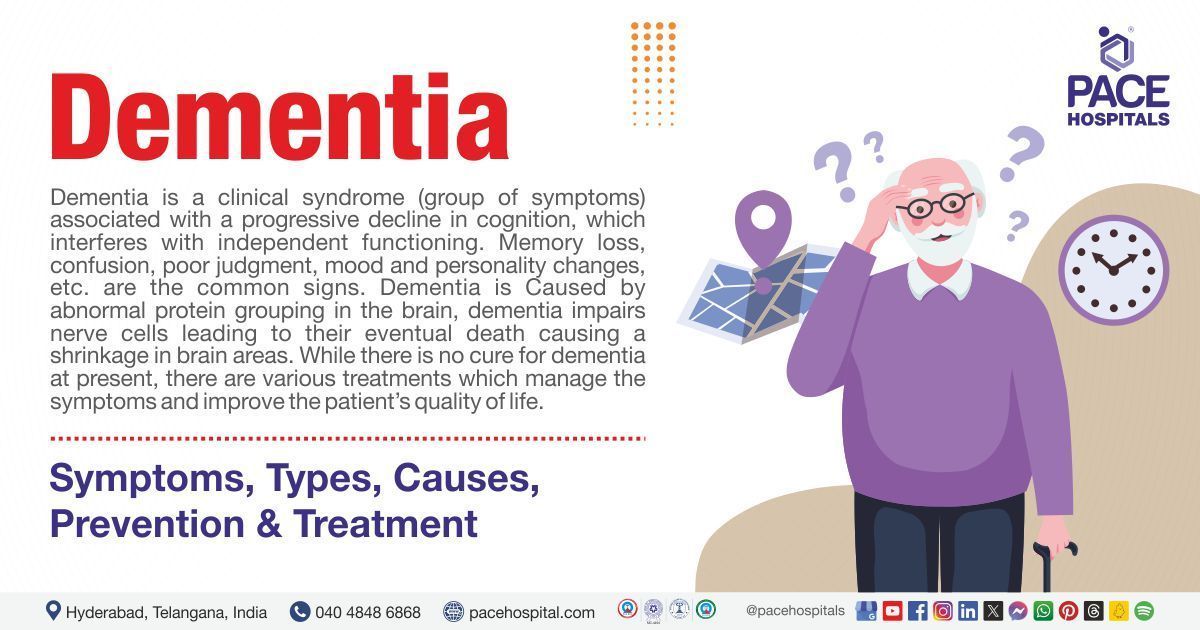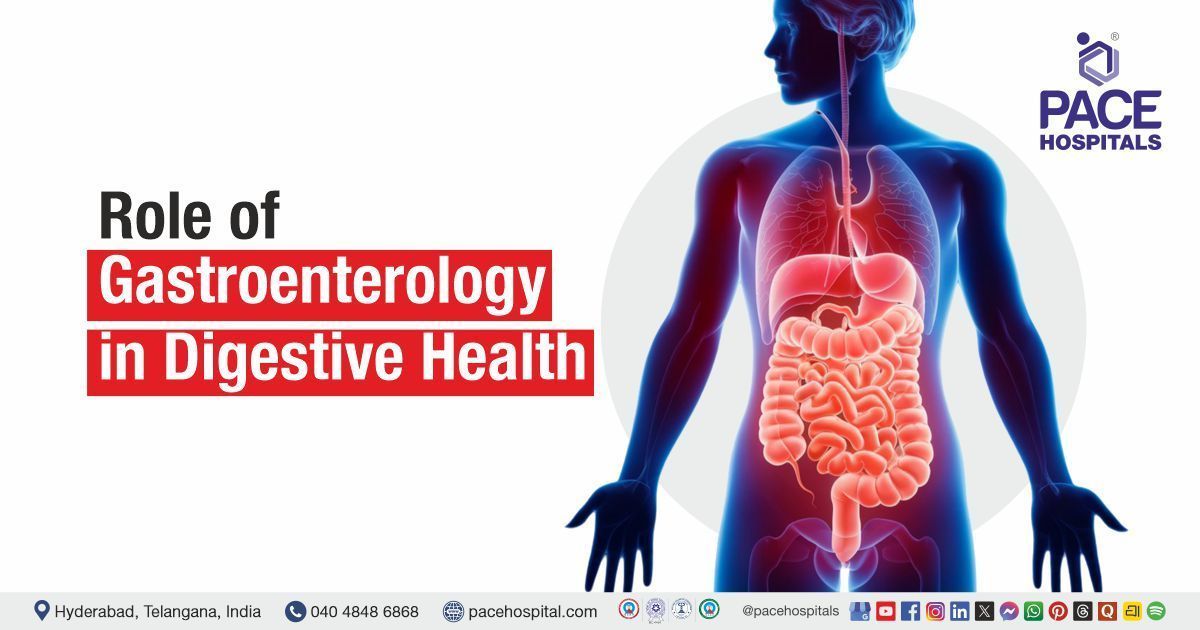Dementia Disease - Symptoms, Types, Causes, Prevention and Treatment
Pace Hospitals
Dementia definition
Dementia is a clinical syndrome (group of symptoms) associated with a progressive decline in cognition, which interferes with independent functioning. Common signs include Memory loss, confusion, poor judgment, mood, and personality changes, etc.
Dementia is caused by abnormal protein grouping in the brain, dementia impairs nerve cells, leading to their eventual death and causing a shrinkage in brain areas. While there is no cure for dementia at present, there are various treatments that manage the symptoms and improve the patient's quality of life.
Dementia is an umbrella term detailing a clinical syndrome of progressive cognitive decrease. It is also called a major neurocognitive disorder. According to the Diagnostic and Statistical manual of Mental disorders (DSM-5) criteria, the definition of dementia has been updated. It is now termed as Major Neurocognitive Disorder (MND) rather than dementia.
However, due to the common use of the term dementia in society and medical literature, it will be called both Major neurocognitive disorder and dementia. Dementia is a common public health burden that increases the cost of care to society and individuals.
Dementia meaning
Dementia is derived from the Latin root “demons”, meaning being out of one's mind. Though "dementia" has been used since the 13th century, it was mentioned in the medical community in the 18th century.
Prevalence of dementia
Dementia prevalence is expected to increase with time due to the increase in the proportion of people aged 65 years and above. In fact, the proportion of elderly population is faster than that of those below the age of 65.
Prevalence of dementia worldwide
Currently, worldwide, over 60% of the people living in low-and middle-income countries, and more than 5.5 crore people have dementia, and the number is expected to increase by 2050 to 13.1 crore. Nearly 1 crore new cases are registered every year.
Prevalence of dementia in India
The estimated prevalence of dementia among adults aged 60 and above in India is 7.4%. Which accounts for approximately 88 lakhs of Indians older than 60 years are living with dementia. And, for every five years, the number of people with dementia approximately doubles. According to one meta-analysis study, The prevalence of dementia was more significant in women than in men, as well as in rural areas compared to urban areas.
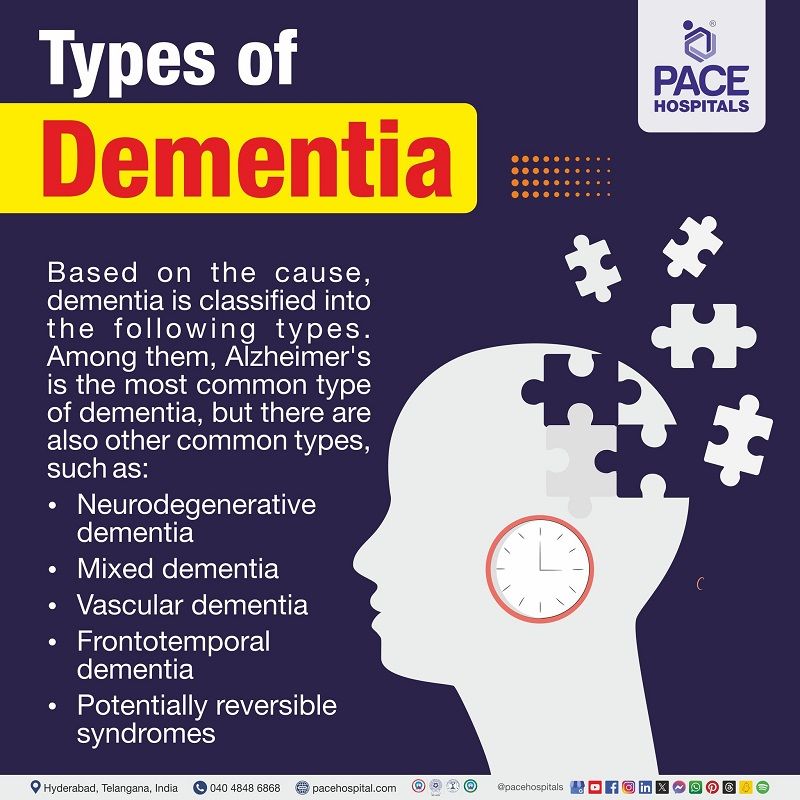
Types of dementia disease
Based on the causes, dementia is classified into the following types. Among them, Alzheimer's is the most common type of dementia, but there are also common types such as:
- Neurodegenerative dementia
- Alzheimer’s disease
- Lewy body dementia
- Mixed dementia
- Vascular dementia
- Frontotemporal dementia
- Potentially reversible syndromes
- Depression
- Medication-induced
- Metabolic derangement (Vitamin B12 deficiency, thyroid disorders, thiamine deficiency, chronic disease etc.)
- Gastrointestinal disorders (Whipple’s disease, vitamin E deficiency, pellagra)
- Structural brain lesions (Tumour, subdural hematoma, normal pressure hydrocephalus)
- Infectious (Neurosyphilis, HIV/AIDS)
The 4 common types of dementia— Alzheimer's disease, Vascular dementia, Lewy body dementia and Frontotemporal dementia are described below along with other types of dementia.
Alzheimer’s disease (AD)
60% to 80% of cases are Alzheimer's disease, which is the most common neurodegenerative disease-causing dementia. Grouping of beta-amyloid plaques and neurofibrillary tangles in the hippocampus and entorhinal cortex causes neuronal injury and death. More precisely, abnormalities in the neurotransmitter, including the reduced activity of choline acetyltransferase, which is involved in acetylcholine synthesis, and a reduced number of cholinergic neurons, cause Alzheimer's dementia. And the critical factor contributing to the development of Alzheimer's disease is genetics.
Lewy body dementia
Inside neurons, the abnormal deposits of alpha-synuclein protein (Lewy bodies) cause Lewy body dementia, which accounts for nearly 5% to 15% of all dementias.
Mixed type dementia
It consists of symptoms of both disorders. Alzheimer's and vascular dementia share the same symptoms and are difficult to diagnose the type.
Vascular dementia
Multi-infarct dementia also known as vascular dementia, and it is the second most prevalent form of dementia, accounting for 20% of cases. Conditions that either block or reduce blood flow to the brain causing neuronal deprivation of oxygen, and thus vascular dementia occurs, and stroke is the most common cause.
Frontotemporal dementia
Disorders like pick’s disease, which affects the frontal and temporal lobes of the brain, constitute frontotemporal dementia (FTD) and occur at a younger age (40–75 years) than AD.
Potentially reversible syndromes
The most common causes of potentially reversible syndromes are medications, depression, and metabolic diseases. Identifying and treating the above medical conditions may help people with dementia.
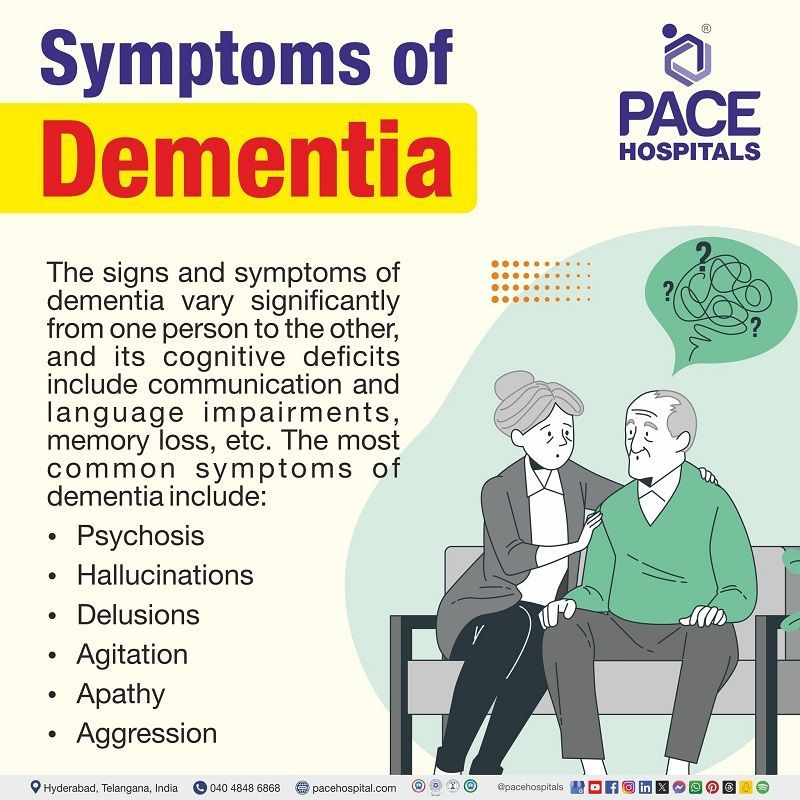
Dementia symptoms
The signs and symptoms of dementia vary significantly from one person to the other. The most common symptoms of dementia include:
- Psychosis (collection of symptoms that affect the mind)
- Hallucinations (a false perception of objects or events involving senses)
- Delusions (one or more firmly held false beliefs that persist for at least one month)
- Agitation (a feeling of irritability or severe restlessness)
- Apathy (lack of interest)
- Aggression (any behavior, including verbal events, that involves attacking another person, animal, or object with the intent of harming the target.)
- Cognitive deficits (describe the impairment of different domains of cognition).
Synaptic failure, inflammation, and changes in cerebral metabolism cause injury to the cerebral cortex, which results in cognitive impairment. The common cognitive deficits include:
- Communication and language impairments
- Memory loss
- Apraxia (inability to perform correctly learned skilled movements even though the patient has normal sensation)
- Agnosia (failure to recognize common objects, people, or sounds)
- Impaired executive function (judgment, planning, and reasoning)
Let's explore the distinct signs and understand how each condition goes alongside common dementia symptoms:
Alzheimer’s dementia symptoms
The first sign is short-term memory loss; multiple cognitive deficits may develop progressively. Alzheimer’s disease symptoms are classified as cognitive and noncognitive.
- Cognitive symptoms: Include memory loss (poor recall), disorientation (impaired perception of time, inability to recognize familiar people), aphasia, agnosia, apraxia, and impaired visuospatial and executive function.
- Noncognitive symptoms: Include depression, psychotic symptoms (hallucinations, delusions), and behavioural symptoms (such as physical and verbal aggression, wandering, motor hyperactivity, uncooperativeness, repetitive mannerisms, and combativeness).
In the end stage, they may lack the ability to hold up their head and track objects with their eyes, and they cannot also sit.
Vascular Dementia symptoms
Depending on the regions affected in the brain and the severity of damage to the blood vessel, its symptoms can vary.
- Confusion, vision loss, disorientation, speaking difficulty, and understanding speech are the most common symptoms seen after a major stroke.
- Memory loss may not occur after a stroke in vascular dementia, but a sudden change in thinking and reasoning might be seen.
Lewy body dementia symptoms (LBD symptoms)
- Fluctuating cognitive impairment with changes in attention and alertness, recurrent complex visual hallucinations, and spontaneous parkinsonism can be seen in Lewy body dementia.
- In the early stages of LBD, bradykinesia, rapid eye movement (REM), rigidity, and sleep disorders are observed.
Frontotemporal dementia symptoms (FTD dementia)
- FTD dementia symptoms include personality changes and behavioural disturbances and occur at the start of the disease.
- The visuospatial function is usually not affected in frontotemporal dementia.
Risk factors for dementia
Several factors can increase the chance of people developing dementia. Some can be avoided or reduced, called 'modifiable risk factors' and others cannot be changed, called 'non-modifiable risk factors'. The following are some of the risk factors that may be associated with the development of dementia:
Modifiable risk factors for dementia
Many cardiovascular and lifestyle factors (associated with other chronic diseases) and social factors constitute the modifiable risk factors of dementia, including:
- Poor Diet: A high saturated fat, salt, sugar, and low fiber diet can increase the risk of high blood pressure (hypertension) and cholesterol.
- Diabetes (high blood sugar): Diabetes may cause atherosclerosis and stroke, and both may contribute to developing vascular dementia.
- Hypertension (high blood pressure): High blood pressure has been related to higher dementia risk.
- Low levels of education: Poor education may affect the cognitive function of the brain.
- Obesity: Being obese or being overweight can increase the risk of developing diabetes and increases the risk of developing vascular dementia.
- Traumatic brain injury: Dementia symptoms may be seen in traumatic brain injury people.
- Hearing loss: Hearing loss can cause an impoverished (poor) environment, leading to decreased cognition.
- Smoking tobacco: Arteries become narrow, blood pressure increases, and the risk of cardiovascular diseases increases in smoking.
- Excessive intake of alcohol: Because of excessive intake of alcohol, the risk of heart disease, cancer, and brain damage increases.
- Less physical activity: The risk of cardiovascular diseases and diabetes increases due to lack of physical activity, and hence, dementia may occur.
- High cholesterol: High levels of bad cholesterol, also called low-density lipoprotein (LDL), increase a person's risk of developing vascular dementia.
- Greater levels of homocysteine: (An amino acid produced when proteins are broken down)
Some of the other conditions like multiple sclerosis, heart disease depression, atrial fibrillation, social isolation, air pollution, sleep apnoea, and brain infections like meningitis and neurosyphilis may also result in dementia.
Non-modifiable risk factors for dementia
Aging: The main risk factor for dementia is aging. The chances of developing dementia increase with the increase in age. While dementia can occur in people aged below 65 every 5 or 6 years, the risk of developing dementia doubles for people aged over 65. Family history, and other genetic mutations or variations (namely, the apolipoprotein E (APOE) ε4 gene and Down syndrome) are the other non-modifiable dementia risk factors.
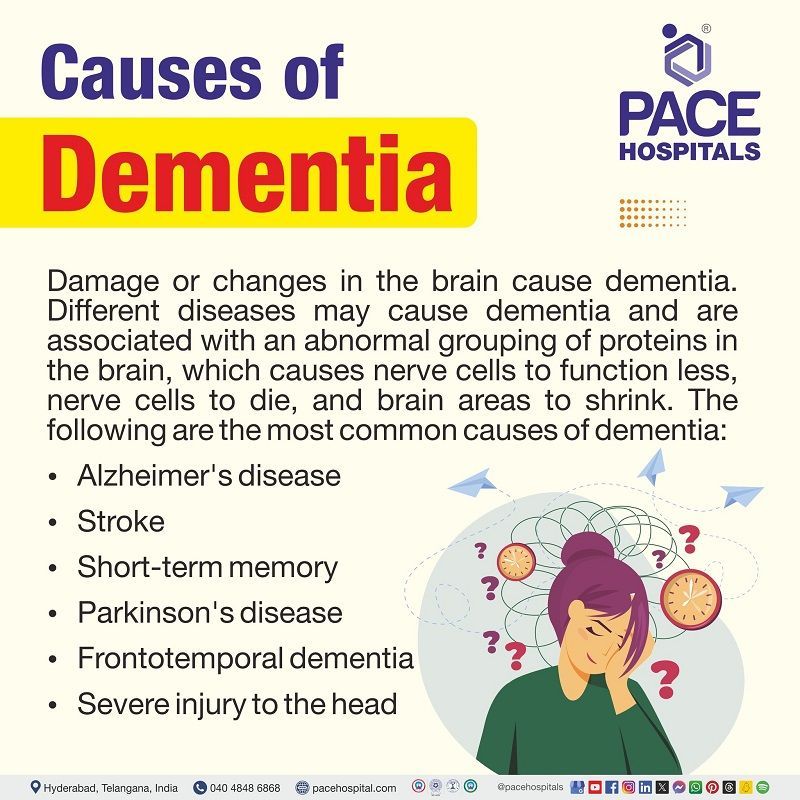
Dementia causes
Damage to or changes in the brain causes dementia. Different diseases may cause dementia and are associated with an abnormal grouping of proteins in the brain, which causes nerve cells to function less, nerve cells to die, and brain areas to shrink.
The most common causes of dementia are:
- Alzheimer's disease: This is the most common cause of dementia.
- Stroke: Vascular dementia can be seen in people with long-term hypertension (high blood pressure), severe hardening of the arteries, or several small strokes. The second most common cause of dementia is stroke.
- Short-term memory: In Lewy body dementia, short-term memory loss can be seen.
- Parkinson's disease: Progressive disorder affecting the nervous system affecting movement.
- Frontotemporal dementia: Like Pick's disease
- Severe injury to the head
Less common causes of dementia include:
- Leukoencephalopathies (deeper, white-matter brain tissue is affected)
- Huntington's disease (inherited disorder that causes neurons in parts of the brain to gradually break down and die)
- Creutzfeldt-Jakob disease (a rare and fatal condition that damages brain tissue)
- Multiple-system atrophy (condition of a group of degenerative brain diseases that affect speech, movement, and autonomic function)
- Amyotrophic lateral sclerosis (ALS) (causes the death of motor neurons in the brain and spinal cord)
- Multiple sclerosis (MS) (damages the myelin sheaths in the brain and spinal cord)
- Infections (late-stage syphilis).
Some of the treatable causes of dementia include:
- Some medicinal side effects.
- Heavy alcohol use over a long period
- Head injury from a fall or accident.
- A sudden state of confusion and disorientation (delirium)
- Thyroid, kidney, or liver problems
- Blood clots, tumours, or brain infections
- Emotional issues like stress, anxiety, or depression
- Certain vitamin deficiencies
- Normal pressure hydrocephalus (NPH) which is an abnormal buildup of cerebrospinal fluid in the brain
Complications of dementia
Dementia complications include behavioural and psychological symptoms. Dementia can affect many systems in the body and can cause the following complications:
- Memory loss: The most common complication of dementia-related psychosis is memory loss
- Pneumonia: It is the most common cause of death in people with frontotemporal dementia.
- Fractures due to falls: Dementia people may fall and suffer injuries like fractures.
- Hallucinations: A false perception of objects or events involving senses
- Delusions: one or more firmly held false beliefs that persist for at least one month.
- Agitation: Person restless or worried
- Dysphagia: Difficulty in swallowing
- Inability to perform self-care tasks: People with dementia may face difficulties performing their daily tasks.
- Apathy: Lack of interest
- Depression: Dementia may even lead to depression in some people.
- Disorientation: People becoming confused and frustrated.
- Insomnia: Sleeplessness is seen in people with dementia.
- Trouble with problem-solving: People with dementia will have a more challenging time doing their daily routines.
- Poor judgment: Impulse shopping and not dressing for the weather
- Inadequate nutrition: personal safety challenges, incontinence, and infections are some of the other complications of dementia.
Difference between delirium and dementia
Delirium vs dementia
Delirium is a change in the state of consciousness, characterized by episodes of confusion, that can develop over hours or days, whereas dementia is associated with a progressive decline in cognition, which interferes with independent functioning. Both conditions can affect cognition. Mainly, memory and other cognitive functions are affected by dementia, and attention and awareness deflect are caused by delirium.
The following parameters can distinguish delirium and dementia:
| Parameters | Delirium | Dementia |
|---|---|---|
| Causes | It is typically caused by acute illness or medication or recreational drug toxicity (sometimes life-threatening) | It is typically caused by anatomic changes in the brain |
| Course | It is often reversible | Generally irreversible, |
| Effects | Attention and awareness are caused by delirium | Memory and other cognitive functions |
| Onset | Sudden | Slow and gradual |
| Duration | Days to weeks, although it may be longer | Usually, permanent |
Difference between dementia and amnesia
Amnesia vs dementia
Although both amnesia and dementia are altered states of brain activity, they are two different diseases. Memory loss is the common symptom of both, but below parameters can distinguish amnesia and dementia.
| Parameters | Amnesia | Dementia |
|---|---|---|
| Causes | It is a general term describing memory loss | It is typically caused by anatomic changes in the brain |
| Course | First stage of amnesia is reversible, second stage of amnesia is irreversible | Generally irreversible, |
| Effects | Memory loss, confusion, inability to recognise known patients | Memory and other cognitive functions |
| Onset | Sudden | Slow and gradual |
| Duration | May be temporary or permanent | Usually, permanent |
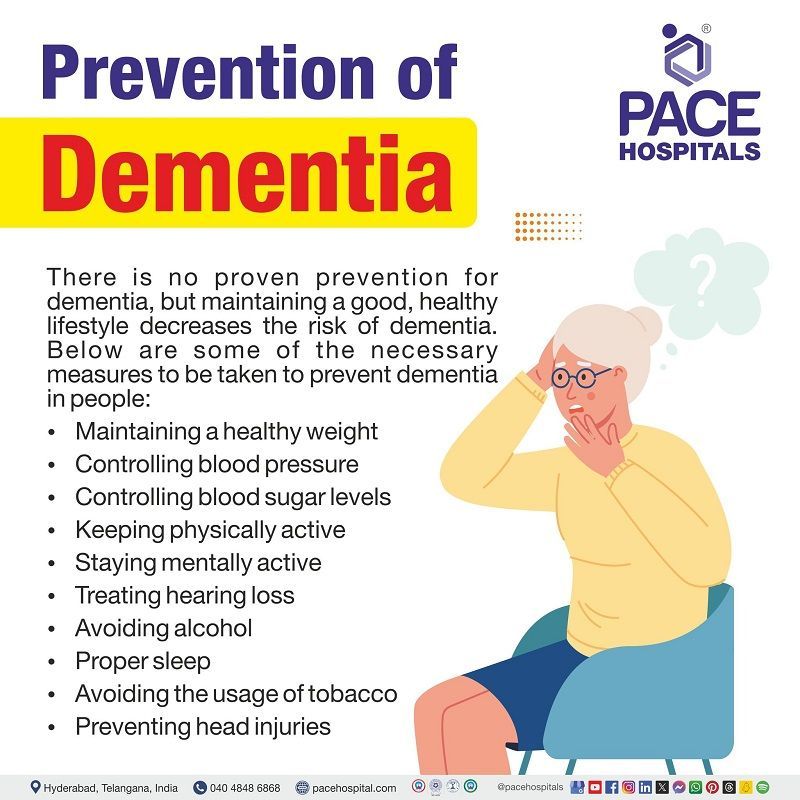
Dementia prevention
There is no proven prevention for dementia, but maintaining a good, healthy lifestyle decreases the risk of dementia. Below are some of the necessary measures to be taken to prevent dementia in people:
- Maintaining a healthy weight: The risk of diabetes and heart disease is high in obese or overweight people. Maintaining a healthy weight decreases the risk of diseases.
- Controlling blood pressure: The risk of stroke and vascular dementia increases with increased blood pressure. Lifestyle modifications like regular exercise and quitting smoking can reduce the risk of vascular dementia.
- Controlling blood sugar levels: Abnormal blood sugar levels lead to diabetes, which can increase the chances of stroke, heart disease, and dementia; hence, blood sugar levels must be controlled.
- Keeping physically active: 150 minutes of moderate-intensity physical activity each week can benefit people, keep them physically active, and prevent many diseases.
- Staying mentally active: Activities that keep mentally stable need to be followed, like playing games, socializing, etc.
- Treating hearing loss: The risk of dementia increases in hearing loss patients; hence, it needs to be treated.
- Avoiding alcohol: Drinking too much alcohol leads to the risk of diabetes, hypertension, and stroke. So, people need to limit the alcohol consumption.
- Proper sleep: Sleeping seven to eight hours each night keeps the body and mind fit.
- Avoiding the usage of tobacco: The risk of stroke, heart attack, and lung disease can be reduced by avoiding tobacco.
- Preventing head injuries: Wearing seatbelts and helmets protects from concussions and other brain injuries.
Dementia diagnosis
Knowing the cause of dementia involves a holistic approach, includes taking a person's medical history and conducting physical examination, lab & imaging tests, and mental status examination can help doctors diagnose dementia quickly. Here is an overview of the steps involved in the nursing diagnosis for dementia.
- Medical history
- Cognitive and neurological tests
- Lab investigations such as blood tests, lumbar puncture (To test for specific proteins in the spinal fluid)
- Imaging tests such as computed tomography (CT) scan, magnetic resonance imaging (MRI) Brain scans, single-photon emission computed tomography (SPECT) and positron emission tomography (PET) scans.
- Psychiatric evaluation
- Genetic tests
- Vascular tests like head and neck magnetic resonance angiogram (MRA) or computed tomography angiogram (CTA)
- Brain tests include
electroencephalogram (EEG), cardiac tests like electrocardiogram (ECG), echocardiography, and ambulatory cardiac rhythm monitoring.
Dementia treatment
There is no cure for dementia, but a
neurologist may recommend the goal of therapy that include lifestyle modifications, nonmedical and medical management to improve the function.
Lifestyle modifications include:
- Proper sleep
- Adequate exercise
- Taking an anti-inflammatory diet
- Avoiding stress-related activities
- Regular exercise may benefit patients with cognitive dysfunction and older adults.
- Regular aerobic exercise (30 mins/day), with strength training, improves behaviour and functioning, reducing depression in Alzheimer's disease.
Nonpharmacological management of dementia include:
- Cognitive training, aromatherapy, music therapy, and massage help maintain a healthy environment.
- Behavioural techniques can manage agitation and anxiety
- Socialization, such as family gatherings, may be helpful in dementia patients.
Medical management of dementia include:
- Acetylcholinesterase inhibitors
- Selective serotonin-reuptake inhibitors
- NMDA antagonists
- Antipsychotics
- Vitamin deficiencies, hypothyroidism, and depression need to be treated appropriately at therapeutic dosing.
FAQs - Frequently Asked Questions on Dementia
What is the difference between dementia and Alzheimer’s?
Dementia is a clinical syndrome associated with a progressive decline in cognition, which interferes with independent functioning. Alzheimer's, a neurodegenerative disease, is the most common type of dementia, with progressive impairment of behavioural and cognitive functions.
What are the ten warning signs of dementia?
Warning signs of dementia include Memory loss, confusion, poor judgment, mood and personality changes, challenges in problem-solving, difficulty completing known tasks, trouble understanding, difficulty in speech, misplacing things, and reduced concentration on work.
What is the most significant risk factor for dementia?
The important risk factor for dementia is aging; the chances of developing dementia increase with the increase in age. While dementia can occur in people aged below 65, every 5 or 6 years, the risk of developing dementia doubles for people aged over 65.
Can dementia be cured?
Presently, there is no cure for dementia because different diseases cause dementia. There is no single cause of dementia. However, some of the available treatments can help in managing the symptoms and improve the patient’s quality of life.
Can anxiety lead to dementia?
Yes. A meta-analysis study published in 2016 demonstrated that older adults with anxiety had a 57% greater risk of developing dementia. The risk is even higher for anxiety with a late-life onset, which might indicate that anxiety in older adults would be an early sign of dementia.
What is dementia?
Dementia is a clinical syndrome associated with a progressive decline in cognition, which interferes with independent functioning. Dementia is not one specific disease, but is a group of symptoms caused by different types of diseases.
Is dementia hereditary?
A strong genetic link may be present only in rare types of dementia, but it counts for only a tiny proportion of overall cases of dementia. Children and grandchildren do not inherit in the majority of dementia cases.
Is Parkinson's related to dementia?
Yes, Parkinson's disease is related to dementia. Parkinson’s disease is a movement disorder that causes muscles to tighten and become rigid, thus making it hard to walk and do other daily activities. They may also have tremors, and they may develop cognitive problems like memory loss and dementia.
Why do dementia patients not sleep?
Generally, people with dementia feel tired and sleepy during the daytime, and they take more naps during the day. Due to this, they cannot sleep properly at night; thus, the body clock and the body's normal cycle of day and night are disrupted by dementia.
What is the clock test for dementia?
A simple neuropsychiatric instrument, The Clock drawing test (CDT), can be applied to assess several cognitive functions. It is used as an early screening of cognitive impairment, mainly in dementia, In the Clock Drawing Test (CDT) the patient is asked to draw a clock. The neurologist checks for the visual-spatial, numerical sequencing, and planning abilities which can be evaluated by the placement of the numbers around the circle. The test also assesses long-term attention, memory, auditory processing, motor programming, and frustration tolerance.
How to deal with dementia patients?
Speaking calmly and reassuring the patient, giving their personal space, keeping the loved ones' photographs around them, and distracting with activities that reduce stress help deal with dementia patients.
What is vascular dementia?
The second most prevalent form of dementia, also termed multi-infarct dementia, is vascular dementia, comprising 20% of cases, and is caused when decreased blood flow damages brain tissue. Blood flow may be reduced by a partial blockage or entirely blocked by a blood clot.
Does diabetes cause dementia?
High blood sugar, called diabetes, can cause nerve damage to the eyes, feet, and hands and also damage the brain, blood vessels, and nerves, causing atherosclerosis and stroke. Both may contribute to developing vascular dementia.
How to treat dementia?
Dementia can be treated by lifestyle modifications like adequate exercise, having an anti-inflammatory diet, proper sleep, and pharmacological treatment, including medications like acetylcholinesterase inhibitors, NMDA antagonists, antipsychotics, and selective serotonin-reuptake inhibitors, and other cognitive training and aroma therapy.
Share on
Request an appointment
Fill in the appointment form or call us instantly to book a confirmed appointment with our super specialist at 04048486868

